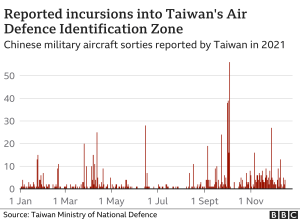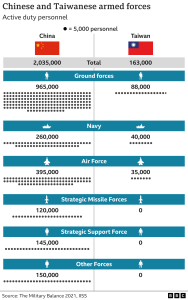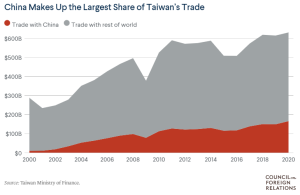On November 15th, 2021, President Joe Biden and Chinese President Xi Jinping met in a virtual summit. Both President Biden and President Xi sought to ease tensions between the two great powers. However, due to the US’ economic and military commitment to Taiwan, President Xi and Biden failed to make progress on strengthening the relationship.
Xi said that America’s assisting Taiwan is like “playing with fire.” This Chinese warning addressed America’s approach to the Taiwan conflict, originating with Mao Zedong’s takeover of mainland China in 1949. Now, seven decades later, the Cross-Straits Relations seem to be at a boiling point where the likelihood of war is greater than ever.
Historical Background
After a four-year long civil war, Mao Zedong unified all of mainland China under his communist regime. On the first day of October of 1950, Chairman Mao Zedong formally declared the establishment of the People’s Republic of China in Beijing. The People’s Liberation Army formed a firm dominance over mainland China. As a result, Chiang Kai-shek – leader of the democratic Chinese party – and his forces withdrew to the small island of Taiwan.
Since 1949, Taiwan enjoyed international recognition from many countries as the Republic of China due to Mao’s early isolationist policies. However, in 1971, the People’s Republic of China (PRC) gathered enough votes in the UN General Assembly to be admitted as the representative of China to the UN General Assembly and Security Council. In 1972, President Richard Nixon visited China, re-established relations with the PRC, and signed the Shanghai Communique. This document reaffirmed China’s claim as the only China, and established Taiwan as a separate state. In 1979, the US established diplomatic relations with the PRC. Since 1979, the US continues to maintain formal diplomatic ties with the PRC and unofficial relations with Taiwan.
Present Cross-Straits Relations
Is the crisis worsening?
In the latter months of 2021, China sent overwhelming numbers of military aircraft into Taiwan’s Air Defense Zone. This zone is where foreign aircraft are identified and monitored closely.

In response to China’s incursions, the Taiwanese military began to conduct military exercises in preparation for a possible invasion. The video below includes the Taiwanese military practicing urban warfare, air-to-air battles, and naval drills.
China’s Reasons and Plans
There are still conflicting views about the chance and time of China’s invasion. US military commanders in the Indo-Pacific Command believe China could invade Taiwan within the next decade. However, there are some who believe China will attempt an invasion on 2049. 2049 is a critical date China’s leader Xi Jinping consistently repeats. Xi strongly stresses the importance of the Chinese Dream, which sees China achieving its great-power status restored. Also, 2049 is the 100th anniversary of the establishment of the People’s Republic of China.
As of now, in terms of military size and capabilities, except the United States, the Chinese outspends every other country on the planet. Specifically, China’s defense spending to Taiwan’s ratio is 15:1.

China’s moves against Taiwan
In 2016, China restricted tourism to Taiwan, causing a decline from 4 million tourists in 2017 to less than 3 million in 2019.
In 2020, Taiwan accused Chinese hackers of infiltrating into more than ten government agencies and thousands of government officials’ emails to gain the government’s data and information.
During Taiwan’s 2020 presidential elections, China spread disinformation to damage Tsai Ing-Wen’s campaign and instill divisions within the Taiwanese government. However, Tsai Ing-Wen still won the re-election.
Despite Taiwan’s exports to China increasing, China pressured many countries to not sign free trade deals with Taiwan. As a result, only a handful of countries and two developed countries – New Zealand and Singapore – signed trade deals.
Recently, the People’s Liberation Army (PLA) in northern China released a video demanding Taiwan’s immediate surrender. And at a conference in Beijing, spokesperson Zhu Fenglian described the PLA as the “guardian of national interests” in the Taiwan Strait.
Taiwan’s Policies
As of now, Taiwan still remains reliant on China for trade. However, China’s political pressure on Taiwan and Taiwanese leaders’ concerns with large economic reliance on China, are eroding national ties.

From 2008 to 2016, Taiwan’s President Ma Ying-jeou signed two dozen economic pacts with the PRC. One of these economic pacts was the 2010 Cross-Straits Economic Cooperation Framework Agreement. This agreement allows China and Taiwan to resume air and sea mail links, which enable bankers and insurers to work and cooperate together.
Under Tsai Ing-Wen’s new leadership in 2019, the Taiwanese government signed the New Southbound Policy, which boosted Taiwan’s trade in Southeast Asia. Up until now, the new president still encourages Taiwanese manufacturers working in mainland China to move back to the island nation.
Importance of Taiwan
Currently, Taiwan leads the world in manufacturing semiconductor chips. Semiconductor chips are used in smartphones, military equipment, vehicles, computers, etc.
Taiwan Semiconductor Manufacturing Company (TSMC) is known for being the 2nd largest chip producer and supplier that makes one of the smallest and most advanced chips. TSMC is only behind South Korean-based Samsung in terms of chip manufacturing.

A number of experts advocate the United States not depend on Taiwan to produce semiconductor chips. The reason for this is due to fears of a Chinese invasion of the island nation. Currently, under the Biden administration, the US is pushing for withdrawing assets in Taiwan and expanding the US capacity to produce semiconductor chips.
Predictions and Scenarios for a Possible Invasion
In December 2021, Admiral Philip Davidson testified before Congress that Taiwan might only have six years before being invaded by China. Davidson’s reason for this is that 2027 will mark the 100th anniversary of the People’s Liberation Army establishment.
Although President Xi Jinping promises to bring peace and unity, there are possibilities of a Chinese surprise cyber and military attack right before Taiwan’s presidential election in 2024. This might result in the Chinese-friendly KMT party winning the election.
Finally, there is one big threat to Taiwan. Lai Ching-te, also known as William Lai, is running for the Democratic Progressive Party in the 2024 presidential elections. If he wins, then there will be a high chance that China will take military action against Taiwan. This is due to Beijing referring to Lai as a separatist and independence supporter who is a threat to China.
However, in the case of an invasion, China has many concerning issues regarding their logistics and supplies. Up to now, the Chinese PLA shows deficiencies in logistics, supplies, amphibious capabilities, and naval warfare, all of which will be needed to invade the island nation.
Conclusion
Although political and military experts possess different views on the conflict, the future of the Cross-Straits Relations remains uncertain. We still don’t know whether the US will actually lend its economic and military support to Taiwan in a war against China. However, if China attempts to invade Taiwan, many sovereign countries, especially those in Asia, will look to the US for a diplomatic response. The next few months or years or decades might continue to be a cold war between the two Chinas unless one decides to initiate a hot war.
Stay tuned to The Roundup for more political updates!
